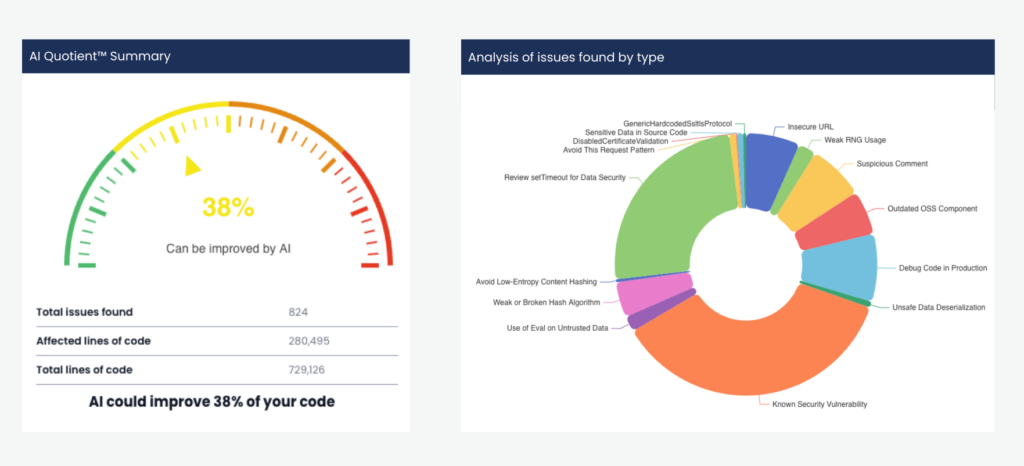As businesses scale and evolve, the software that underpins operations must also keep pace. However, many organizations face a significant challenge: code complexity. Complex code often leads to scalability issues, making systems more difficult to maintain, extend, and secure over time. In this article, we’ll dive into what code complexity entails, how it can impact scalability, and how tools like The Code Registry’s AI Quotient can help reduce complexity, identify code issues and ensure long-term scalability.

What is Code Complexity?
Code complexity refers to how complicated and difficult to understand a software system’s source code is. It’s usually the result of developers adding new features, handling edge cases, and creating temporary fixes, which over time lead to code that is hard to read, maintain, and test.
There are two primary types of code complexity:
- Cyclomatic Complexity: Measures the number of independent paths through a program. Higher numbers indicate more potential paths for code execution, making it harder to test and maintain.
- Cognitive Complexity: Refers to how difficult the code is for a human to understand. Even if code functions correctly, high cognitive complexity makes it hard for developers to follow logic and make changes without introducing bugs.
Both of these forms of complexity can dramatically increase the time needed to debug, modify, and extend software. For growing companies, this can present a significant barrier to scalability.
To learn more about the different types of code complexity we’d encourage our readers to explore our dedicated article where we have written a more comprehensive summary of how it is calculated and how you can interpret it across your software development, read the full article here >>

The Impact of Code Complexity on Scalability
Scalability when referring to software can be articulated in two ways, firstly it can be in relation to the ability of a system to handle increased loads and grow with a business. When a software system is not scalable, it may struggle to support higher volumes of users, data, or transactions.
Secondly, it can refer to how fast or easily the software system can be developed upon. Highly scalable software or source code, means developers are able to write and deploy new code regularly. It also means the codebase is easy to maintain and implement patches or security updates on with limited impact on business operations. When the codebase is highly complex, it can mean that even simple code changes and deployments need to go through rigorous testing and rounds of review prior to going live to ensure there are limited knock-on effects of the code changes being deployed – slowing down business innovation and issue resolution.
Here’s how code complexity impedes scalability:
- Slower Development Cycles: Complex code is harder to modify, leading to longer development times when adding new features or fixing bugs.
- Increased Risk of Errors: As complexity grows, the chances of introducing errors during updates increase. This can make the software fragile and less reliable.
- Decreased Performance: Complex code often leads to inefficiencies in processing, making the system slower under higher loads.
- Cost of Maintenance: More complex systems require more effort to maintain. This increases the total cost of ownership, reducing the efficiency of development teams.
- Difficulty in Onboarding New Developers: Complex code is hard for new developers to understand, making it harder for teams to scale quickly as the business grows.
These challenges can bottleneck a company’s ability to expand its services or adapt to changing market conditions, making it essential to address code complexity proactively.
How Reducing Code Complexity Improves Scalability
If after using a tool like The Code Registry, you establish your software or codebase is highly complex and have experienced some of the issues noted above then all is not lost. There are plenty of ways to implement processes and tools to enable a code complexity reduction program, this is often referred to as Code Refactoring. The benefits of which could be highly lucrative for your business in the long run and result in:
Improved Maintainability: Clean and well-structured code is easier to maintain. Developers can quickly identify and fix issues without unintended consequences, reducing the time needed for bug fixes and updates.
Enhanced Performance: Reducing redundant or convoluted code logic can optimize performance, leading to faster execution times, especially under load.
Faster Feature Development: With less complexity, developers can more easily add new features and extend the software, which supports scalability as business needs evolve.
Easier Debugging: Simple, modular code makes it easier to isolate and resolve issues, reducing downtime and improving reliability.
Reduced Technical Debt: Tackling complexity early on helps minimize technical debt, the accumulated cost of using quick fixes and inefficient code. By keeping technical debt low, future development becomes less costly and time-consuming.
Tools for Reducing Code Complexity
Reducing code complexity involves more than just rewriting code from scratch. Developers need tools and methodologies that allow them to identify complexity hotspots and guide refactoring efforts. This is where The Code Registry’s AI Quotient can provide significant value.
The Role of The Code Registry’s AI Quotient
The AI Quotient within The Code Registry platform is designed to help business leaders and developers alike gain insights into their codebase and its complexity. Here’s how it can help reduce code complexity, identify bad coding practices and improve scalability:
Automated Complexity Analysis: The AI Quotient continuously monitors your code, identifying areas where complexity is high, such as functions with excessive cyclomatic complexity or dense logic. It highlights areas of concern so developers know where to focus their efforts.
Automated Code Insights: As the development team commits new code or changes, the AI Quotient, alongside all of the other AI-powered intelligence, evaluates how these changes have impacted the overall complexity of the system. This ensures that complexity is reduced over time instead of being allowed to grow unchecked.
Code Quality Scoring: The Code Registry uses uses thousands of rules to assess potential code quality issues, taking complexity into account. This allows development teams to maintain high standards, producing code that is easy to scale and maintain as the business grows.
Recommendations for Refactoring: In addition to detecting complexity, the AI Quotient suggests specific actions to improve your codebase (which will therefore reduce your complexity). For example, it may recommend breaking a large function into smaller, more manageable pieces or replacing a convoluted logic chain with a clearer, more modular solution.
Tracking Progress Over Time: Scalability isn’t achieved overnight. The AI Quotient provides historical insights, enabling teams to track how complexity evolves over time. This gives business leaders the ability to see progress and ensures that the codebase is heading in the right direction.
Risk Management: The AI Quotient helps identify potential risks related to complex code early on. By proactively addressing complexity, companies can prevent performance bottlenecks and system failures before they impact scalability.

Best Practices for Reducing Code Complexity
While using the AI Quotient can help manage code complexity and improve your overall codebase quality, developers should also follow best practices to ensure long-term scalability:
- Modular Design: Break code into smaller, reusable components. This not only reduces complexity but also makes the codebase easier to extend and scale.
- Consistent Naming Conventions: Well-named variables and functions make the code more readable, reducing cognitive complexity for developers.
- Code Reviews: Regular code reviews help maintain code quality and catch complexity issues before they become ingrained.
- Refactoring: Make refactoring a regular part of the development cycle. Don’t wait until complexity has become a problem—address it incrementally.
What Next?
Code complexity can significantly hinder the scalability of a software system, but businesses that proactively manage complexity are better equipped to scale their operations. By understanding the impact of complexity and leveraging tools like The Code Registry’s AI Quotient, organizations can reduce technical debt, improve performance, and ensure their software can grow with the business. Implementing best practices alongside these tools will ensure that your codebase remains scalable, maintainable, and high-performing in the long run.
Want to Learn More?




